Substitute for Coconut Sugar in Baking
You've got several reliable substitutes for coconut sugar in baking, with each option offering distinct advantages. For granulated alternatives, use light brown sugar or palm sugar in a 1:1 ratio for the closest match in taste and texture. If you prefer liquid sweeteners, try maple syrup (use 3/4 cup for every cup of coconut sugar) or agave nectar (use 1/4 cup per cup), but remember to adjust other liquid ingredients accordingly. For low-carb options, consider monk fruit (1:3 ratio) or stevia (2:1 ratio), though these may require recipe modifications due to their concentrated sweetness. Understanding each substitute's unique properties will help you achieve the best possible results in your recipes.
This post may contain affiliate links. If you make a purchase through these links, I may earn a commission at no additional cost to you. Additionally, portions of this post may be generated using artificial intelligence (AI) technology. While we strive for accuracy, please be aware that AI-generated content may not always be perfect and should be fact-checked when necessary.
The Spatula Scoops
- Light brown sugar offers a perfect 1:1 substitution ratio with similar caramel notes and moisture properties to coconut sugar.
- Maple syrup can replace coconut sugar at a 3:4 ratio, but requires reducing other liquid ingredients by 1/4 cup.
- Monk fruit and stevia provide zero-calorie alternatives, though measurements need adjustment due to their intense sweetness.
- Regular granulated sugar works as a basic 1:1 substitute but lacks the caramel undertones of coconut sugar.
- Palm sugar provides nearly identical results in taste and measurement, making it an excellent direct replacement.
Understanding Coconut Sugar
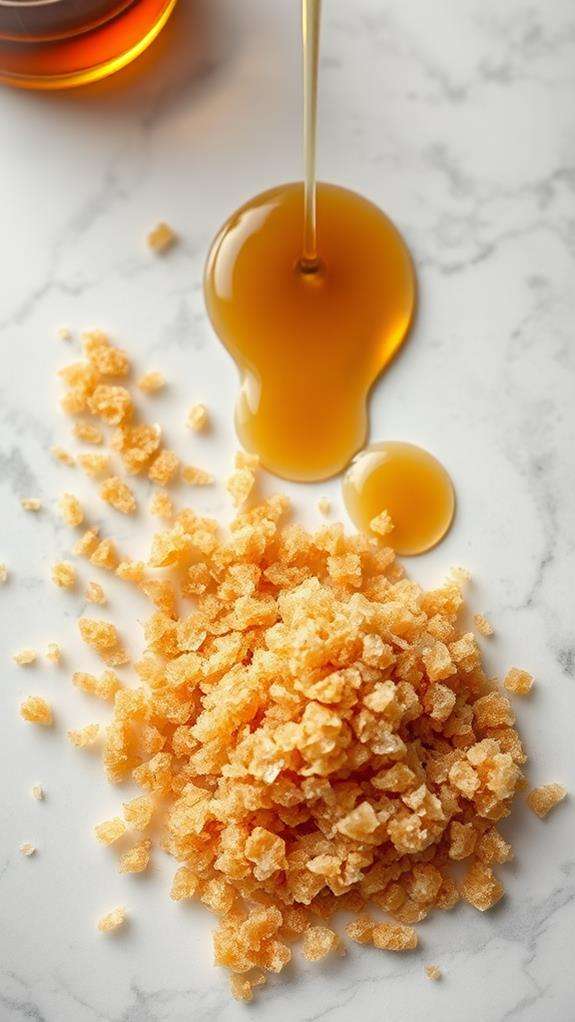
Versatility makes coconut sugar an increasingly popular choice for health-conscious bakers. When you're looking for a less processed sweetener, you'll find that coconut sugar, derived from coconut flower sap, retains valuable trace vitamins and minerals, including iron and zinc, that you won't get from refined alternatives.
You'll notice coconut sugar's distinct caramel flavor enhances your baking goods while offering a lower glycemic index of 35, compared to regular sugar's 60. This means you're getting the benefit of lowering blood sugar spikes when you incorporate it into your recipes. When substituting coconut sugar in your baking, you can follow a simple 1:1 ratio with light brown sugar, making it an easy swap in most recipes.
While it's essential to recognize that the caloric content remains similar to other sugars at 15-18 calories per teaspoon, you're getting a more complex sweetener that works harmoniously in everything from cookies to cakes. The mild, less intense sweetness allows other flavors in your baked goods to shine through, creating more balanced and nuanced results.
Popular Granulated Sugar Alternatives
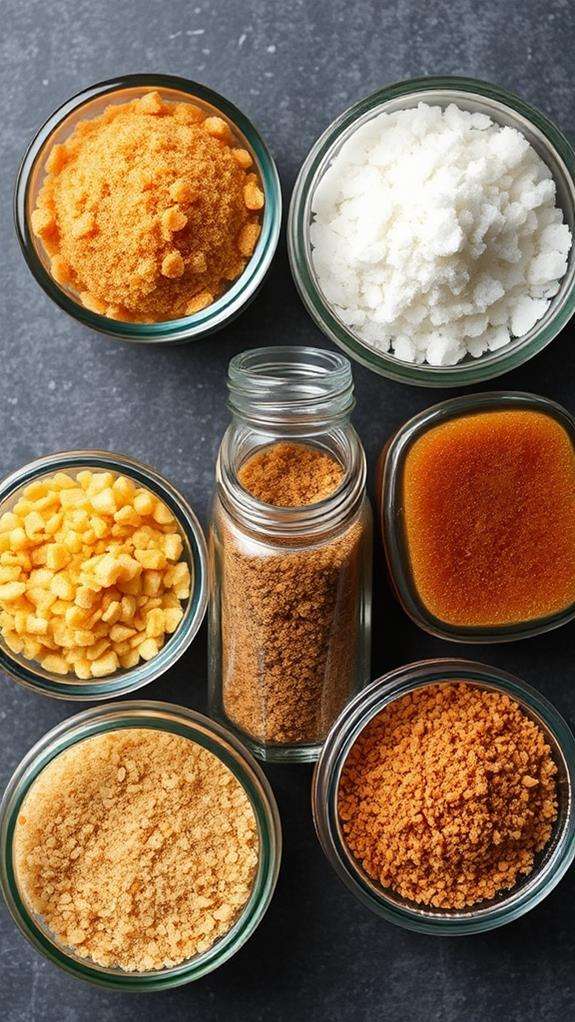
When searching for granulated alternatives to coconut sugar, you'll find several options that can seamlessly integrate into your baking recipes. Each sugar alternative offers unique characteristics while maintaining the sweetness level you're looking for in your baked goods. For instance, using a natural fat like 4th & Heart Grass-Fed Ghee in your recipes can enhance flavors and texture, similar to how coconut sugar adds richness.
Light brown sugar stands out as an excellent coconut sugar replacement, matching both the caramel notes and moisture content perfectly in a 1:1 ratio. If you're looking for another natural option, palm sugar provides nearly identical results due to its similar taste profile and can be used in the same measurements. For a more mainstream choice, granulated white sugar works as a basic substitute, though you'll miss the subtle caramel undertones of coconut sugar.
When seeking a healthier option, consider turbinado sugar, which retains some natural molasses content and provides a mild caramel flavor similar to coconut sugar. For those following a low-carb lifestyle, Swerve brown sugar offers an ideal solution, measuring cup-for-cup like coconut sugar while providing comparable moisture and taste without the caloric impact. You'll find these sugar alternatives particularly useful in recipes where maintaining proper texture is fundamental.
Liquid Sweetener Options

Liquid sweeteners provide viable alternatives to coconut sugar, though you'll need to adjust your recipes to account for the added moisture content. When modifying your baking recipes, understanding the proper substitution ratio for each liquid sweetener guarantees successful results while maintaining the desired consistency.
- Maple syrup substitutes at a 3:4 ratio, requiring 3/4 cup for every cup of coconut sugar, with reduced liquid ingredients
- Agave nectar, being particularly sweeter, needs just 1/4 cup per cup of coconut sugar, but requires careful moisture adjustment
- Honey matches well at a 1:4 ratio, using 1/4 cup per cup of coconut sugar while monitoring overall moisture level
- Brown rice syrup works at a 3:4 ratio, though its thicker consistency may affect texture
- Date syrup requires 2/3 cup per cup of coconut sugar, offering a unique flavor profile
Each natural sweetener brings its distinct characteristics to your baking, so you'll want to experiment with small batches first. Remember to reduce other liquid ingredients proportionally when using these alternatives, as their moisture content considerably impacts the final texture. For precise results, measure carefully and note how each sweetener affects your specific recipes.
Low Carb Sugar Substitutes
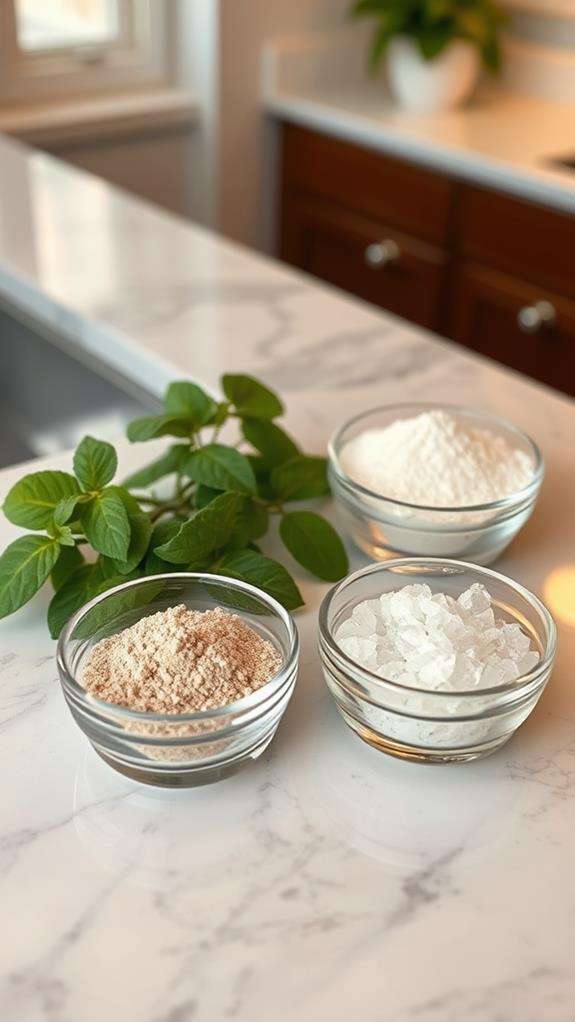
When you're looking to maintain a low-carb lifestyle while baking, you'll find several effective alternatives to coconut sugar, including natural options like monk fruit and stevia, which offer intense sweetness without the carbohydrate load. For quick and easy cooking, contemplate utilizing your Instant Pot Duo Plus, which can help you create low-carb recipes in less time. Sugar alcohols, such as erythritol and xylitol, provide excellent baking results with fewer calories than traditional sweeteners, though you'll want to reflect on their specific properties and conversion ratios for best results. For an all-around solution that works particularly well in baked goods, you might prefer Swerve, which measures like regular sugar and produces reliable results in most recipes while keeping carbs to a minimum.
Natural Keto Sweetener Options
Health-conscious bakers following a ketogenic lifestyle have several natural sweetener options to replace coconut sugar. You'll find these keto-friendly alternatives not only help maintain your low-carb goals but also provide excellent sweetness for your baking needs.
- Monk fruit sweetener stands out as an impressive option, being up to 250 times sweeter than regular sugar, requiring a 3:1 ratio in recipes
- Erythritol offers 70% of sugar's sweetness and works well in a 3:4 ratio to coconut sugar, making it perfect for precision baking
- Stevia, derived naturally from plant leaves, provides intense sweetness at 2-3 times that of coconut sugar, using a 2:1 substitution ratio
- Xylitol substitutes at a straightforward 1:1 ratio but requires careful handling as it's toxic to dogs
- Allulose matches coconut sugar perfectly with a 1:1 ratio while delivering 70% of the sweetness
When selecting your low-calorie substitute, consider the specific requirements of your recipe. Each sweetener brings unique properties to your baking, from moisture retention to browning capabilities. You'll want to experiment with small batches first to perfect your measurements and achieve the desired sweetness level.
Sugar Alcohols Versus Stevia
Choosing between sugar alcohols and stevia brings distinct advantages for your low-carb baking needs. When you're following diabetic diets or looking for a sugar replacement, understanding these alternatives can help you make informed decisions for your recipes.
| Feature | Sugar Alcohols | Stevia |
|---|---|---|
| Calories | 0.24-2.4/gram | Zero-calorie option |
| Sweetness Level | 70-100% of sugar | 50-300x sweeter than sugar |
| Glycemic Impact | Low | Negligible |
| Baking Ratio | 3:4 (erythritol) | 2:1 (stevia to sugar) |
| Best Uses | Direct sugar replacement | Small amounts for intense sweetness |
If you're working with sugar alcohols like erythritol, you'll find they behave similarly to regular sugar in baking, making them excellent for maintaining texture and bulk in your recipes. They're particularly suitable for low-carb diets due to their minimal impact on blood sugar. Stevia, however, offers intense sweetness without calories, but you'll need to adjust your recipes more carefully due to its concentrated nature. When using stevia in baking, you might need to add bulk with other ingredients to compensate for the reduced volume compared to sugar.
Monk Fruit Baking Guide
Baking with monk fruit sweetener offers a powerful low-carb alternative to coconut sugar, packing 250 times more sweetness per gram. As you shift to this zero-calorie option, you'll need to adjust your measurements considerably, using a 1:3 ratio when substituting for coconut sugar in your recipes.
When incorporating monk fruit sweetener into your baking routine, keep these essential factors in mind:
- Use about one-third the amount you'd normally use with coconut sugar to achieve desired sweetness
- Consider blending with erythritol to improve texture and minimize potential aftertaste
- Expect different browning results, as monk fruit doesn't caramelize like traditional sugars
- Monitor baking times carefully, as the reduced bulk may affect cooking duration
- Adjust liquid ratios to compensate for the smaller amount of sweetener used
Understanding monk fruit's unique properties helps you maintain the right flavor profile in your low-carb baking. While it won't provide the same caramelization as coconut sugar, you can achieve excellent results by combining it with erythritol or adjusting your recipe's moisture content. This adaptation guarantees your baked goods maintain their desired texture while keeping carbs and calories low.
Best Baking Ratios
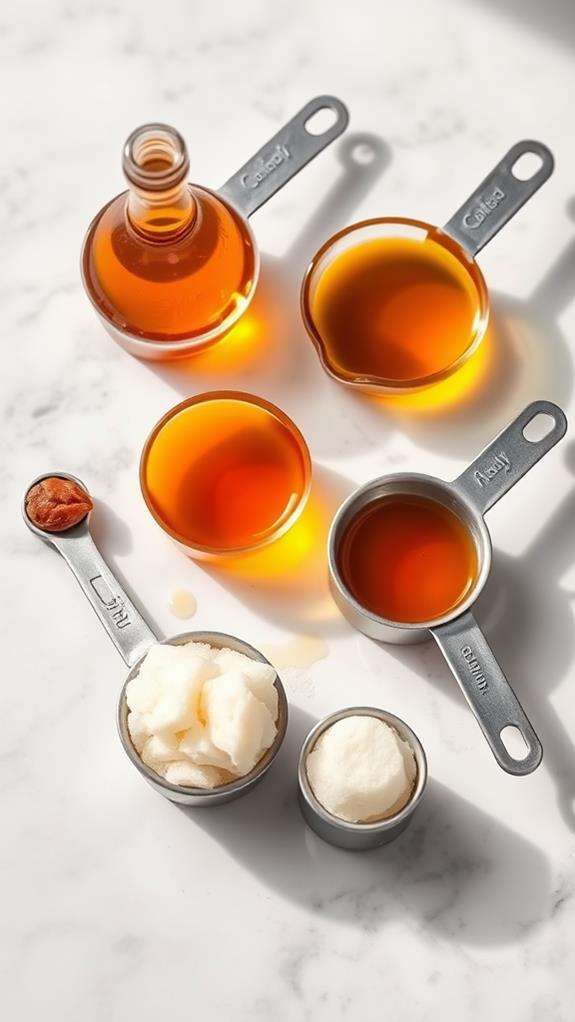
Several precise ratios make substituting coconut sugar straightforward in your baking projects. You'll find that light brown sugar offers the simplest swap at a perfect 1:1 ratio, maintaining both flavor and texture in your recipes. When you're working with granulated white sugar, combine it with molasses – one cup of sugar plus one tablespoon of molasses will give you the equivalent sweetness and color you're looking for.
If you're counting carbs, you'll want to adjust your baking ratios differently. Use erythritol at a 3/4 cup to 1 cup ratio of coconut sugar, which delivers similar sweetness while reducing carbohydrates. For monk fruit sweetener, you'll need considerably less – just 1/3 cup replaces a full cup of coconut sugar due to its concentrated sweetness. When choosing maple syrup as your substitute, use 3/4 cup for every cup of coconut sugar, but remember you'll need to adjust other liquid ingredients in your recipe to maintain the proper moisture balance. These precise measurements guarantee your baked goods turn out consistently delicious, regardless of which substitute you choose.
Flavor and Texture Considerations
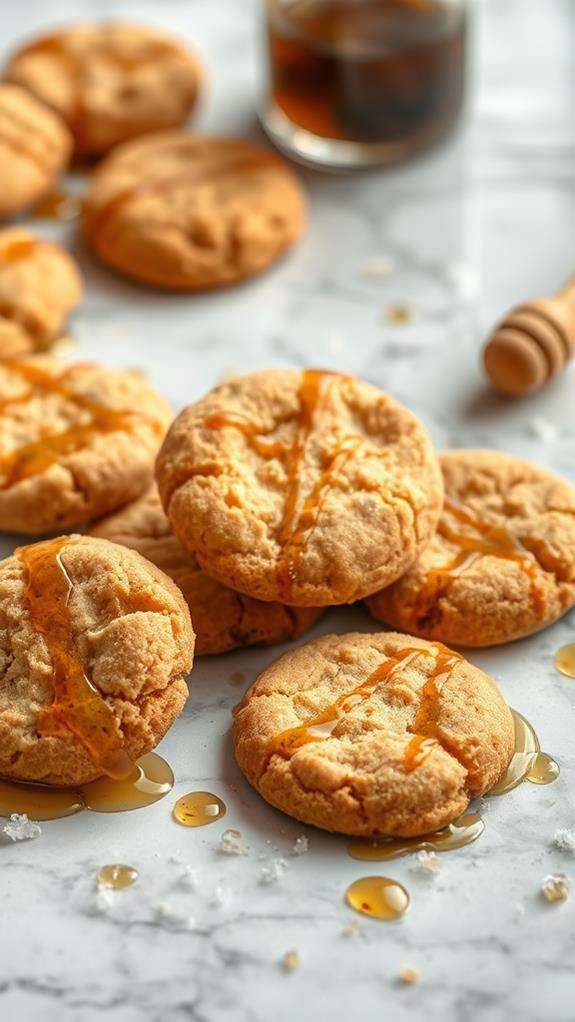
When you're baking with coconut sugar substitutes, you'll notice significant differences in how your ingredients caramelize, as alternatives like light brown sugar tend to brown more quickly at lower temperatures than coconut sugar. These caramelization differences can affect the overall flavor profile of your baked goods, similar to how natural preservatives enhance the taste and safety of uncured pepperoni, which is safe to eat when properly stored uncured pepperoni safety. The moisture content of your substitute will greatly affect your final product, with liquid sweeteners like maple syrup requiring careful adjustment of other wet ingredients to maintain proper texture. The size of sugar granules in your chosen substitute, whether it's fine granulated sugar or coarser turbinado, will influence how evenly the sweetener distributes throughout your batter and impacts the final crumb structure of your baked goods.
Caramelization During Baking
The process of caramelization during baking stands out as one of the key challenges when substituting for coconut sugar. You'll need to understand that coconut sugar caramelizes at a lower temperature (320°F) than regular granulated sugar, which affects how your baked goods brown and develop flavor.
When you're considering alternatives, here's what you should know about caramelization properties:
- Brown sugar provides similar caramelization but adds a stronger molasses flavor
- Maple syrup and other liquid sweeteners won't caramelize the same way, affecting your final texture
- Artificial sweeteners like stevia require significant baking time adjustments
- Regular granulated sugar needs higher temperatures to achieve the same browning effect
- Natural alternatives may create different moisture levels in your finished product
You'll need to adjust your baking time and temperature based on your chosen substitute. For instance, if you're using liquid sweeteners like maple syrup, you might need to reduce your oven temperature slightly and watch carefully for browning. When working with brown sugar, consider that its stronger molasses flavor might overpower more delicate recipes, so you may want to use it in recipes where that rich caramel note is desirable.
Moisture Impact Analysis
Beyond caramelization concerns, moisture content plays a vital role in determining your baked goods' success when substituting coconut sugar. When you're working with liquid sweeteners like maple syrup or honey instead of coconut sugar, you'll need to account for the additional moisture they bring to your recipe.
The granular texture of coconut sugar contributes greatly to your baked goods' structure, and switching to liquid sweeteners can dramatically affect their final texture and consistency. You'll notice that your treats may become denser or chewier when using moisture-rich alternatives. To maintain the desired outcome, you'll need to adjust other liquid ingredients accordingly, typically reducing them by about 1/4 cup for every cup of liquid sweetener used.
Remember that baking time and temperature adjustments are essential when making these substitutions. You might need to lower your oven temperature by 25 degrees Fahrenheit or reduce baking time by 5-10 minutes to prevent over-browning. While you can't perfectly replicate coconut sugar's unique flavor profile, you can achieve successful results by carefully balancing moisture levels and making thoughtful adjustments to your recipe.
Granule Size Effects
Considering granule size differences, your choice of coconut sugar substitute can greatly impact both texture and flavor distribution in baked goods. When you're selecting sugar substitutes, understanding how granule size affects your final product will help you achieve the desired results.
- Coarser granules like turbinado sugar create a crunchier texture and may not dissolve completely
- Finer sugars blend more smoothly into batters, producing an even consistency
- Smaller granules enhance the aeration process, resulting in lighter baked goods
- Large granules can create pockets of concentrated sweetness and caramelized flavor
- Different granule sizes affect how quickly the sugar dissolves during mixing
You'll find that finer sugars, similar to traditional coconut sugar, work best when you're aiming for a smooth, uniform texture in cakes and delicate pastries. However, if you're looking to add interesting texture variations, coarser granules might be your better choice. The aeration process becomes particularly important when you're creaming butter and sugar – finer granules create more air pockets, leading to a fluffier result. Keep in mind that larger granules may not distribute evenly throughout your batter, potentially affecting both texture and flavor consistency.
Health Benefits of Substitutes
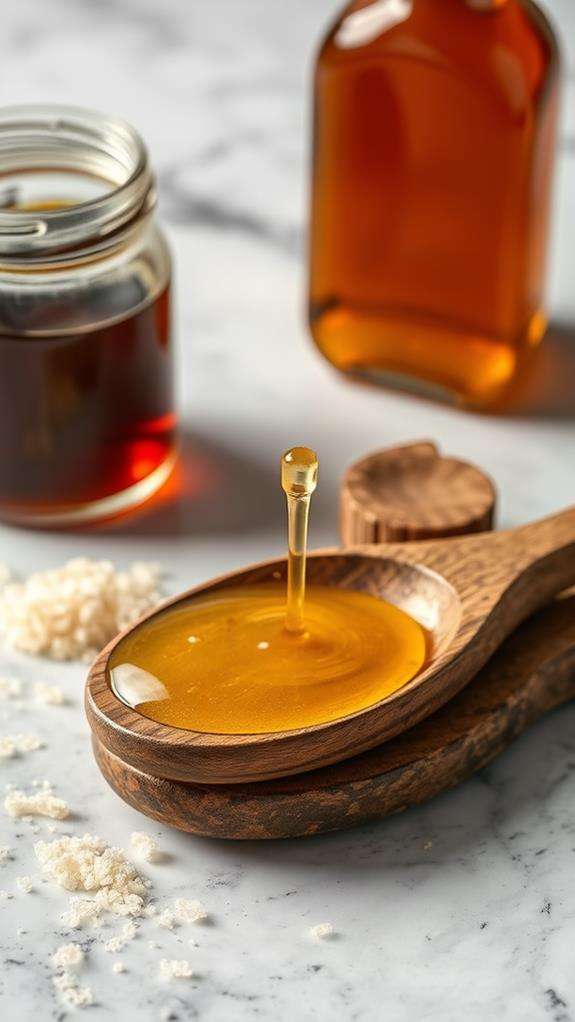
Selecting healthier alternatives to coconut sugar can greatly impact your overall wellness goals. When you're looking to reduce calories while maintaining sweetness in your baked goods, substitutes like stevia and monk fruit stand out as excellent choices. You'll find these alternatives particularly beneficial, as they contain zero calories compared to coconut sugar's 15-18 calories per teaspoon.
If you're managing diabetes or watching your blood sugar levels, you'll appreciate how low glycemic alternatives like stevia and monk fruit won't cause dramatic spikes in your glucose levels. While coconut sugar has a glycemic index of 35, these substitutes effectively register at zero, helping you maintain steadier energy throughout the day. You're not sacrificing nutritional benefits either, as alternatives like maple syrup and honey provide their own unique antioxidants and beneficial compounds. For those concerned about dental health, erythritol offers additional advantages by promoting better oral hygiene compared to traditional sugars. When you're selecting your sweetener, consider how these substitutes can support your specific health needs while still delivering the sweetness you desire in your baked treats.
Recipe Adjustments and Tips

When making the switch from coconut sugar, successful baking requires precise measurements and thoughtful adjustments to your recipes. Understanding the proper ratios for different sugar substitutes will help you achieve ideal baking results while maintaining desired texture and sweetness levels.
- Replace coconut sugar with light brown sugar using a straightforward 1:1 ratio for consistent results
- When using liquid sweeteners like maple syrup, adjust your recipe's liquid content using a 3:4 ratio to prevent excess moisture
- For keto-friendly alternatives, use erythritol at a 3:4 ratio, adding more if needed to reach desired sweetness
- Substitute date sugar at a 1:1 ratio, but remember it won't dissolve as easily in liquid-based recipes
- Test small batches first to perfect your recipe adjustments before scaling up
When working with liquid sweeteners, you'll need to reduce other liquids in your recipe accordingly. For example, if you're using maple syrup, decrease the total liquid content by 25% to maintain proper consistency. If you're following a keto diet, erythritol makes an excellent alternative, though you might need to experiment with amounts to achieve the perfect sweetness level. Remember that each substitute will affect your final product differently, so take notes on what works best for your specific recipes.
Frequently Asked Questions
What Can Be Used in Place of Coconut Sugar?
You've got several reliable options to replace coconut sugar in your recipes. Light brown sugar works perfectly at a 1:1 ratio, offering a similar molasses-like taste. You can also use Sucanat or palm sugar as direct substitutes. If you're working with liquid recipes, maple syrup's a great choice – just use 3/4 cup for every cup of coconut sugar. For a low-calorie alternative, try erythritol at a 3:4 ratio to maintain the right sweetness level.
Can You Replace Coconut Sugar With Brown Sugar?
Like a perfect puzzle piece falling into place, brown sugar can seamlessly replace coconut sugar in your recipes. You'll be glad to know it's a straightforward 1:1 substitution, meaning you can use exactly the same amount. While both sugars share similar molasses content and caramel notes, you'll notice brown sugar has a stronger sweetness. Keep in mind that brown sugar's higher glycemic index (60 vs. 35) might affect your blood sugar more than coconut sugar would.
How Much White Sugar to Replace Coconut Sugar?
You'll want to use a simple 1:1 ratio when replacing coconut sugar with white sugar. For every cup of coconut sugar your recipe calls for, use one cup of white sugar. However, if you're missing the caramel notes that coconut sugar provides, you can add one tablespoon of molasses per cup of white sugar. Remember, you might need to adjust your liquid ingredients slightly, as white sugar has different moisture content.
What Is the Same as Coconut Sugar?
You'll find that palm sugar is fundamentally the same as coconut sugar, as they're both made from palm tree sap, though from different species. While they're not identical twins, you can also find similar alternatives in light brown sugar, turbinado sugar, and Sucanat, which all share comparable sweetness profiles and can be used interchangeably. Date sugar's another close match, though its texture differs slightly from coconut sugar's fine granules.





